 |
|
E-News from State and Federal
Communications, Inc. |
April 2017
|
|
|
Sponsorship for the
2017 Cherry Blossom
Princess for
The Ohio Society of Washington, D.C.,
- as part of National Cherry Blossom
Festival
 State
and Federal Communications is once again the sponsor
of the 2017 Cherry Blossom Princess of The Ohio
Society of Washington, D.C. This year, Nmahawa (Mawa)
Konate is the Ohio winner of the National Conference
of State Societies (NCSS) Cherry Blossom Event and will
be feted with the other princesses at a number of
festivities, dinners, and a parade in Washington
D.C. in early April. State
and Federal Communications is once again the sponsor
of the 2017 Cherry Blossom Princess of The Ohio
Society of Washington, D.C. This year, Nmahawa (Mawa)
Konate is the Ohio winner of the National Conference
of State Societies (NCSS) Cherry Blossom Event and will
be feted with the other princesses at a number of
festivities, dinners, and a parade in Washington
D.C. in early April.
I have the honor of presenting Mawa at the “NCSS
Cherry Blossom Premier Event – Celebration of States
and Territories,” on April 3.
Did you know, since 1948, state and territorial
societies, as well as the international embassy
community, have selected more than 3,000
accomplished young women for their academic
achievement; exceptional poise and appearance;
leadership; interest in social, civic, community,
and world affairs, with a strong desire to serve
others through community service; maturity and
responsibility to represent their respective
states/territories as "Cherry Blossom Princess."
The week-long National Cherry Blossom Festival
allows the ladies to participate in a number of
activities, community service, and cultural exchange
events. The week culminates by selecting one Cherry
Blossom Queen, who is then invited by the Japan
Cherry Blossom Association (JCBA) to visit Japan.
The Cherry Blossom Princess program is a wonderful
event, which State and Federal Communications is so
proud to sponsor. These young women have outstanding
backgrounds and have already achieved much in their
early careers. Our support empowers them to fuel
their dreams of future leadership positions. We look
forward to Mawa representing The Ohio Society of
Washington, D.C., at many events this season.
Mawa is a 2013 graduate of Independence High School
in Columbus and a current student at The Ohio State
University. She is majoring in public affairs and is
currently interning with the Peace Corps as a fellow
in the John Glenn Washington Academic Internship
Program.
Prior to moving to Columbus, she spent her childhood
in Conakry, the capital and largest city in the West
African country of Guinea. She has a passion for
public service and working to eliminate poverty,
hunger, and illiteracy around the world. In her
current position, she is working on the Let Girls
Learn initiative, which seeks to create equal
opportunities for girls in more than 35 developing
countries by helping them overcome traditional
barriers to education. She previously interned with
Unchained, a Columbus, Ohio non-profit organization
helping to raise awareness and combat human
trafficking.
While at The Ohio State University, she has served
as treasurer and vice president for the African
Youth League, was a national delegate on the Social
Matters Committee for the Model African Union, and
has volunteered with the Columbus Metropolitan
Library.
With Mawa’s strong background and interest in making
a difference in this world, we think she would be an
excellent choice for the Cherry Blossom Queen award.
We hope she is chosen for this unique honor!
Thank you.
Elizabeth Z. Bartz
President and CEO
@elizabethbartz
|
|
|
|
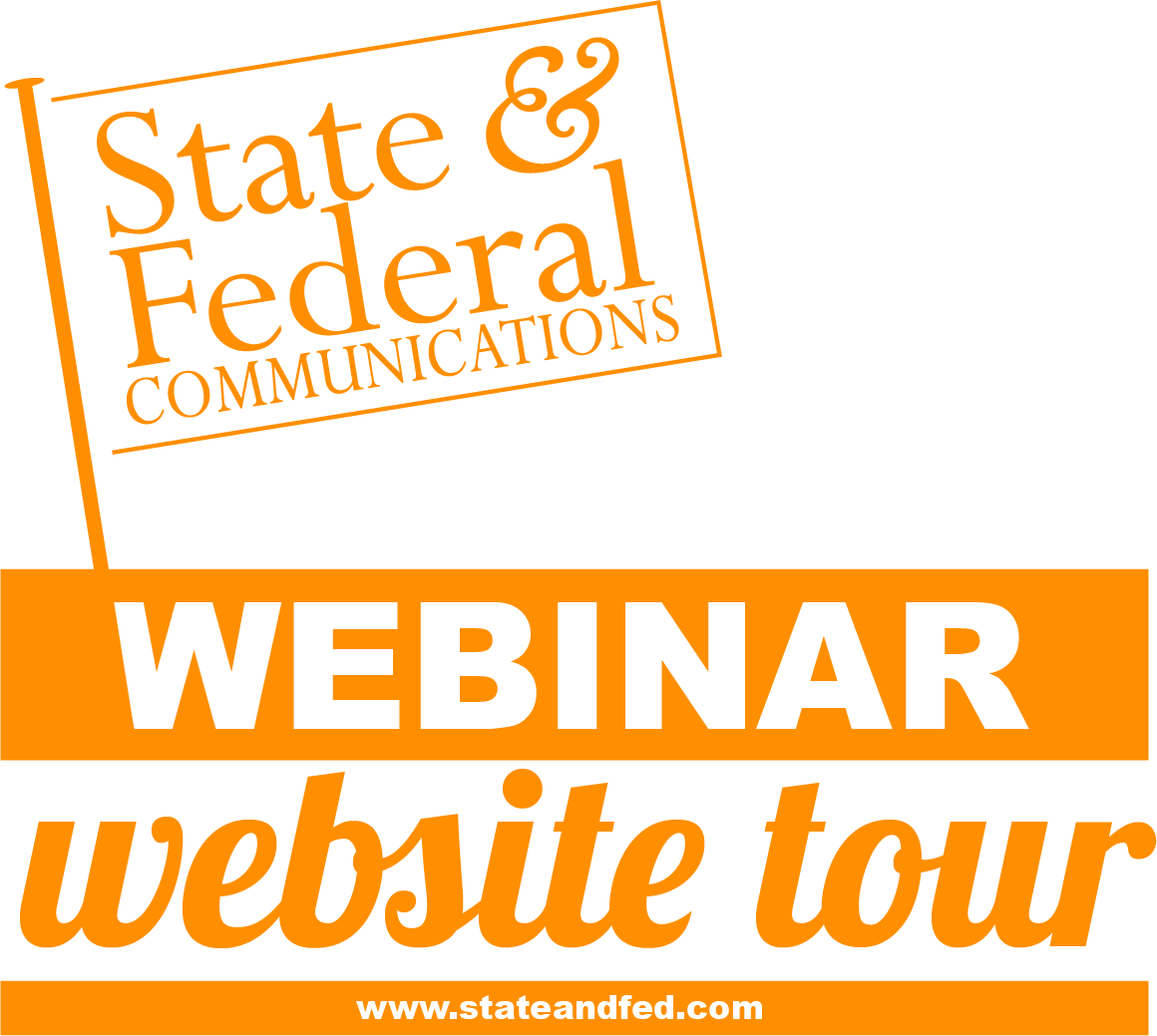 |
|
WEBINAR Website Tour
Each month, State
and Federal Communications, Inc. conducts a
webinar on how to use our website and its many
features.
The next
scheduled tour dates are:
Register to
participate in the tour by clicking our orange
webinar logo. Any questions, contact
marketing@stateandfed.com |
|
|
South
Dakota Repeals and Replaces Voter Approved Ethics Measure
Renae Bpmba, Esq.
Research Associate
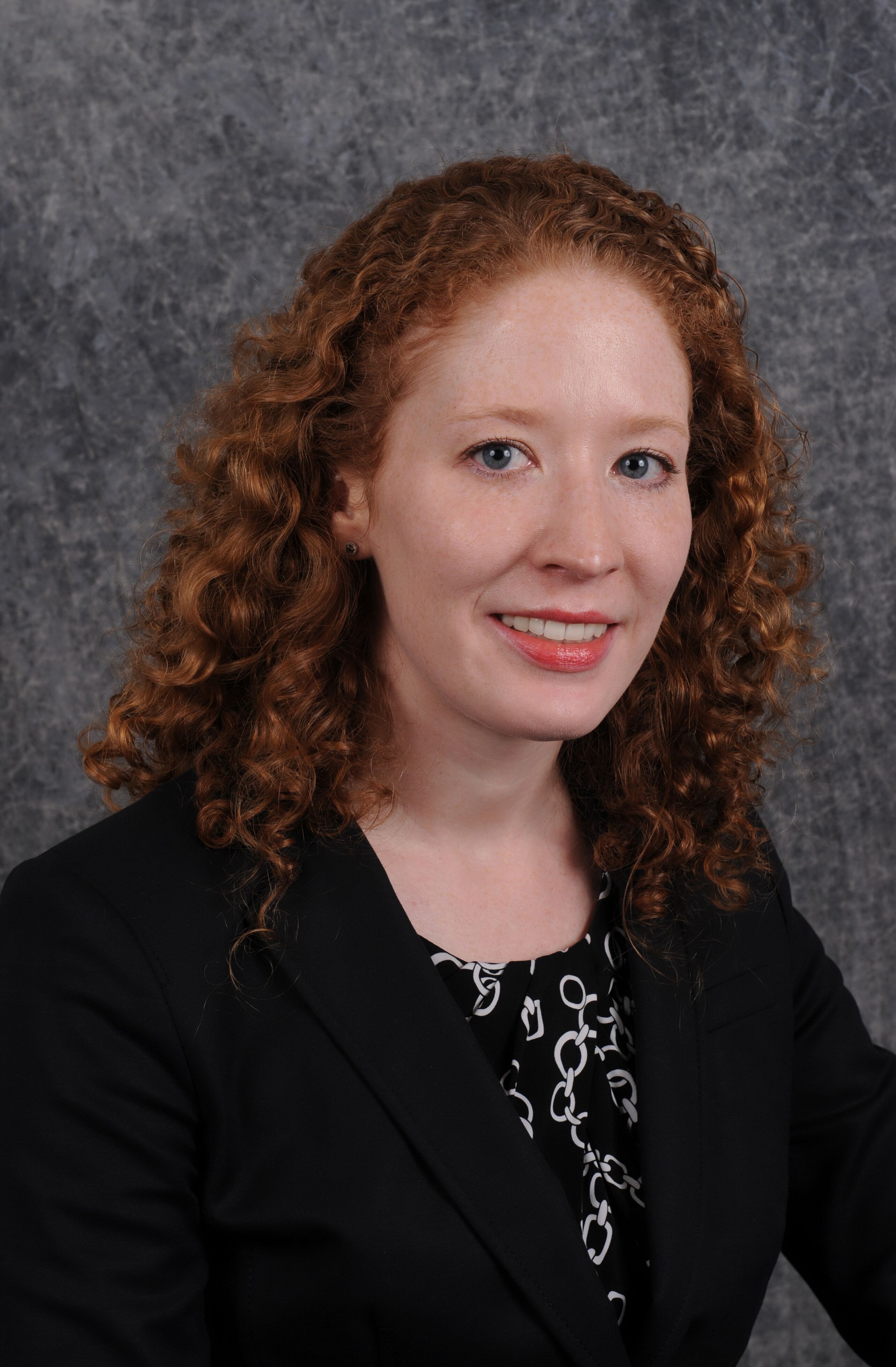 South
Dakota Gov. Dennis Daugaard signed a raft of campaign finance and lobbying
laws to preserve the spirit of Initiated Measure 22 (IM 22) after
lawmakers repealed the voter approved measure earlier this session. South
Dakota Gov. Dennis Daugaard signed a raft of campaign finance and lobbying
laws to preserve the spirit of Initiated Measure 22 (IM 22) after
lawmakers repealed the voter approved measure earlier this session.
IM 22 was a
ballot measure approved by voters in the November 2016 election to
enact an ethics and campaign finance overhaul. The measure created a
publicly funded campaign finance system and lowered contribution
limits. The measure also provided new gift limits and revolving door
restrictions for former state officials. Lawmakers challenged the
constitutionality of IM 22 and won a temporary injunction blocking
the law from taking effect. After the 2017 regular legislative
session commenced, the Legislature quickly passed House Bill 1069 to
repeal IM 22.
After the
repeal of the voter approved measure, many pieces of legislation
were introduced by lawmakers to calm citizen criticisms and replace
provisions of the now repealed IM 22. Senate Bill 54, Senate Bill
131, and House Bill 1073 were among the introduced IM 22 replacement
bills making significant changes to campaign finance and lobbying
laws signed into law by Daugaard this session.
Senate Bill
54 allows organizations, such as corporations and labor unions, to
contribute directly to candidates and restricts candidates from
using campaign funds for personal expenses. Senate Bill 131
prohibits elected officers and officials from lobbying in the
two-year period after termination of service in the state
government, and House Bill 1073 was approved to set a $100 annual
cap on gifts from lobbyists to elected officials. The new laws
become effective July 1, 2017.
[The details for this article have
been updated on our website in the Contribution section of the
Political Contributions Compliance Laws and the Gift and Important
Features sections of the Lobbying Compliance Laws for South Dakota.] |
 Summary of Changes UPDATE Summary of Changes UPDATE
Note Recent Changes to
Compliance Regulations
Michael Beckett, Esq., Research
Manager
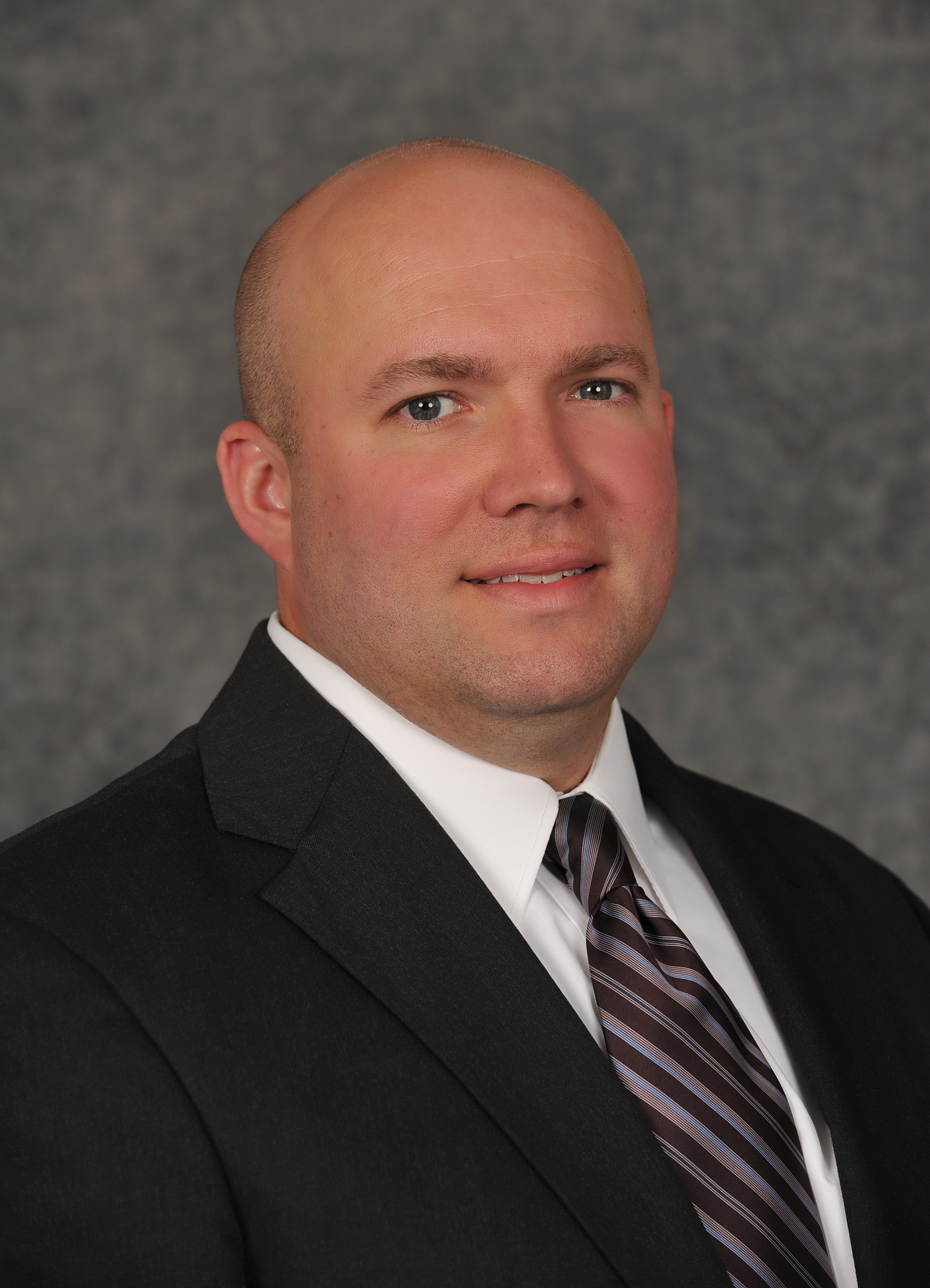
FEDERAL:
Commissioner Ann M. Ravel has resigned from the Federal Election
Commission (FEC). In her February 19 resignation letter to the
president, Ravel urged the prioritizing of campaign finance reform,
additional disclosure requirements, and a reduction of reliance on
the wealthy. Without Ravel, the FEC will have three registered
members of the Republican Party and two registered members of the
Democratic Party. The FEC requires at least four commissioners to
agree for any official action. Ravel’s replacement will be selected
by President Trump and will need confirmation by the U.S. Senate.
While not more than three members of the commission may be
registered with the same political party, the president is not
obligated to nominate a registered member of the Democratic Party.
MISSOURI: The
Ethics Commission recently released a series of advisory opinions
related to Constitutional Amendment 2. The amendment, passed by the
voters in the November election, amended state campaign finance
laws. The new advisory opinions address issues not fully articulated
in the constitutional amendment. Opinions confirm: contribution
limits do not apply to local candidates; the definitions of
continuing and political action committees are substantially the
same and are interpreted to be the same; and contribution limits
only apply to continuing or political action committees if a
contribution to the committee is designated for a specific
candidate. Another opinion finds a limited liability company (LLC)
to be a corporation for the purpose of the corporate contribution
ban if the LLC is an eligible entity electing to be classified as a
corporation under the federal tax code. Other opinions relate to the
eligibility of foreign corporations contributing to Missouri PACs,
the application of the $25,000 per election aggregate limit to be
received by a political party, and the applicability of contribution
limits to state legislative campaign committees.
NEW JERSEY: The
state Appellate Division recently upheld two state agency decisions
related to contractor pay-to-play violations. Della Pello Paving,
Inc. lost two contracts totaling roughly $7 million and was barred
from contracting with the state for the remainder of Gov. Chris
Christie’s second term because it made a $500 contribution to
the Somerset County Republican Organization. State pay-to-play laws
prohibit a contractor from receiving a contract exceeding $17,500 if
it contributed more than $300 during the previous 18 months to a
county political party committee. Della Pello challenged the state
agency decisions claiming the contribution was intended for Sheriff
Frank Provenzano’s campaign and not for the county political
committee. The inadvertent contribution needed to be returned within
30 days to avoid a pay-to-play violation. Della Pello did not
request and receive reimbursement until more than a year after
making the donation; moreover, Provenzano was not running for
re-election the year the contribution was made. Following the
decision of the appellate court, Della Pello’s attorney sought
emergency review by the state Supreme Court, but the court refused
to hear the case.
NORTH CAROLINA:
The North Carolina Supreme Court issued an order blocking Senate
Bill 4 from taking effect while the legal challenge to the law is
pending. This order halts the merger of the State Board of Elections
with the State Ethics Commission. Gov. Roy Cooper is currently
challenging Senate Bill 4 on the basis the General Assembly
overstepped its state constitutional authority when it adopted the
law establishing an eight-member board to oversee elections and
consider ethics complaints and issues.
VERMONT:
Gov. Phil Scott issued an informal directive to staff and
administrative personnel to stay clear of legislators and lobbyists
in social situations. The governor is taking aim at the after-hours
restaurant and bar scene in Montpelier, where staff, lawmakers, and
lobbyists are typically seen commingling. Those in favor of the
governor's directive welcome the crackdown, while others believe
forbidden fraternization is impossible to avoid given the small-town
nature of the state capital. Others are concerned the rule will hurt
business owners who rely on these social outings for revenue. |
Legislation We Are
Tracking
At any given time, more than 1,000
legislative bills, which can affect how you do business as a government
affairs professional, are being discussed in federal, state, and local
jurisdictions. These bills are summarized in State and Federal
Communications' digital encyclopedias for lobbying laws, political
contributions, and procurement lobbying and can be found in the client
portion of our website.
Summaries of major bills are also included
in monthly email updates sent to all clients. The chart below shows the
number of bills we are tracking in regard to lobbying laws, political
contributions, and procurement lobbying.
| |
Total bills |
Number of Jurisdictions |
Passed |
Died |
Carried over
to 2018 |
|
Lobbying Laws |
235 |
38 |
9 |
5 |
0 |
|
Political Contributions |
339 |
44 |
5 |
17 |
0 |
|
Procurement Lobbying |
316 |
43 |
11 |
6 |
0 |
|
 |
W E B S I T E
T I P
Our Lobbying Compliance Laws and Procurement Lobbying
Compliance Laws have extensive information addressing
the restrictions on giving gifts to public officials and
employees. To date, this information has emphasized
rules specific to gifts given by lobbyists and those
given by non-lobbyists. Frequently, subscribers are
interested in rules specific to a third category of
donors: lobbyist employers. Depending on the
jurisdiction, lobbyist employers may be treated the same
as lobbyists, the same as non-lobbyists, or could be
subject to additional rules aimed directly at entities
employing a lobbyist. To address all of these
possibilities, we are adding a question to the Gift Law
section in the Lobbying Compliance Laws and Procurement
Lobbying Compliance Laws titled “Restrictions specific
to lobbyist employers.” Subscribers will now be able to
easily locate gift rules applicable to lobbyist
employers. |
|
|
|
ASK THE
EXPERTS
State and
Federal Communications’ Experts Answer Your Questions
Here
is your chance to “Ask the Experts” at State and Federal
Communications, Inc. Send your questions to
experts@stateandfed.com.
(Of course, we have always been available to answer
questions from clients that are specific to your needs, and
we encourage you to continue to call or email us with
questions about your particular company or organization. As
always, we will confidentially and directly provide answers
or information you need.) Our replies are not legal advice,
just our analysis of laws, rules, and regulations.
|
 |
Our company is a registered
lobbyist employer in many states, and we regularly do
business with universities. Can my company give gifts to
university officials and employees? |
|
 |
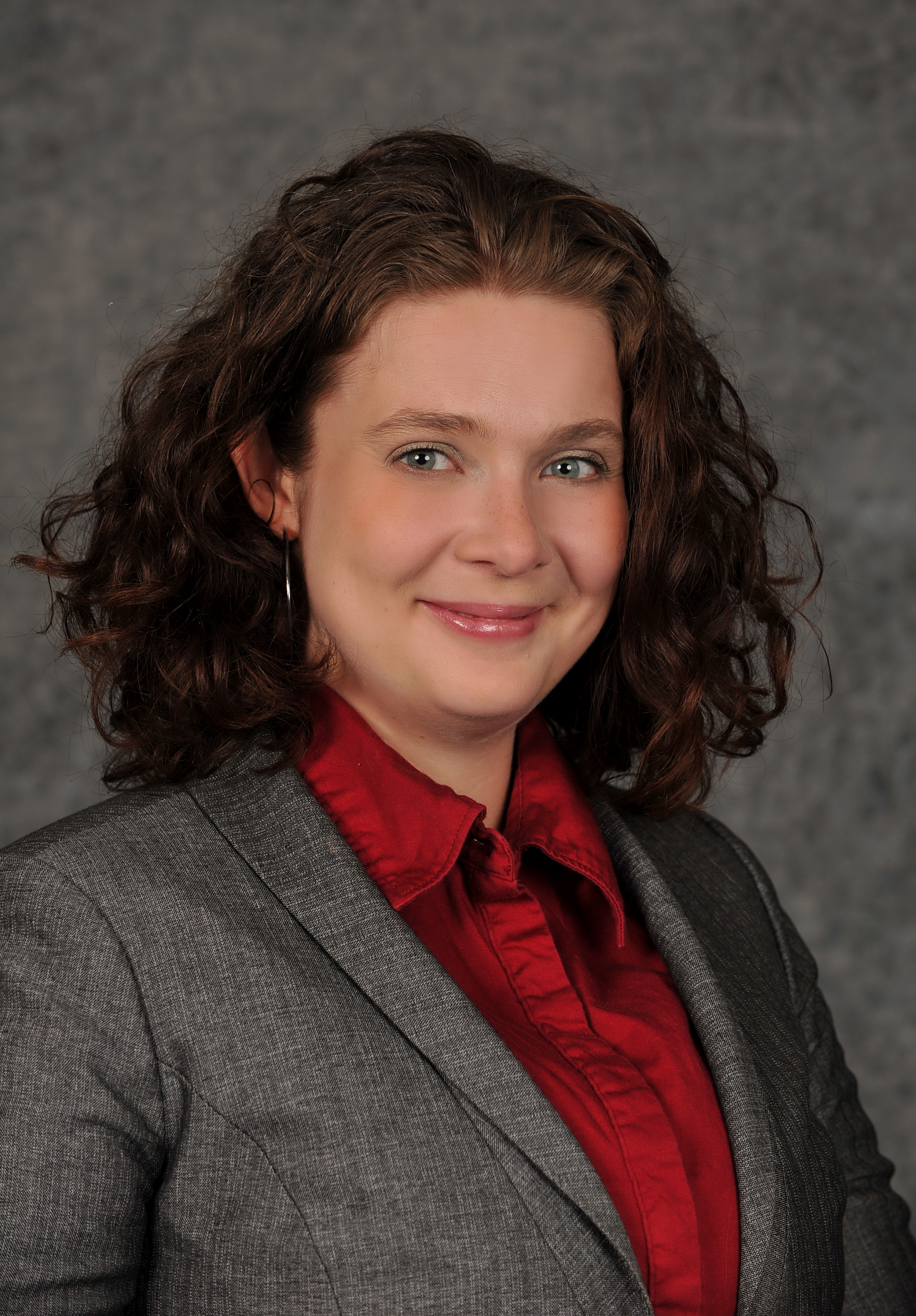
Gifts to
university officials and employees fall under the purview of
state ethics laws in a majority of states. Additionally,
universities will often have more restrictive gift policies
with respect to vendors. It is especially important to
understand what your company can and can’t do at this level,
because university employees (especially professors) are
sometimes unaware of potential restrictions. Potential
penalties can include loss of contracts with a university
and/or state fines. Further, if your company is registered
as a lobbyist employer, some gifts will need to be disclosed
on appropriate reports.
The first step to
determine whether a gift to a university official or
employee will be permissible is to determine the scope of a
state’s gift restrictions...
[You can find more information in the Gift
Laws sections of the Lobbying Compliance Laws and
Procurement Lobbying Compliance Laws online publications. Please feel free to contact us for additional
information.]
Click here to read the full article
Please
fill out the small form to read the full article free!
Thanks.
Myra Cottrill, Esq., Compliance Specialist
|
|
|
|
|

State and Federal
Communications, Inc.
Scrapbook
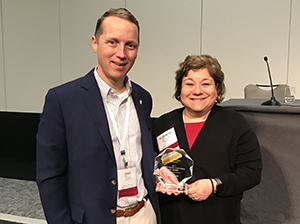 |
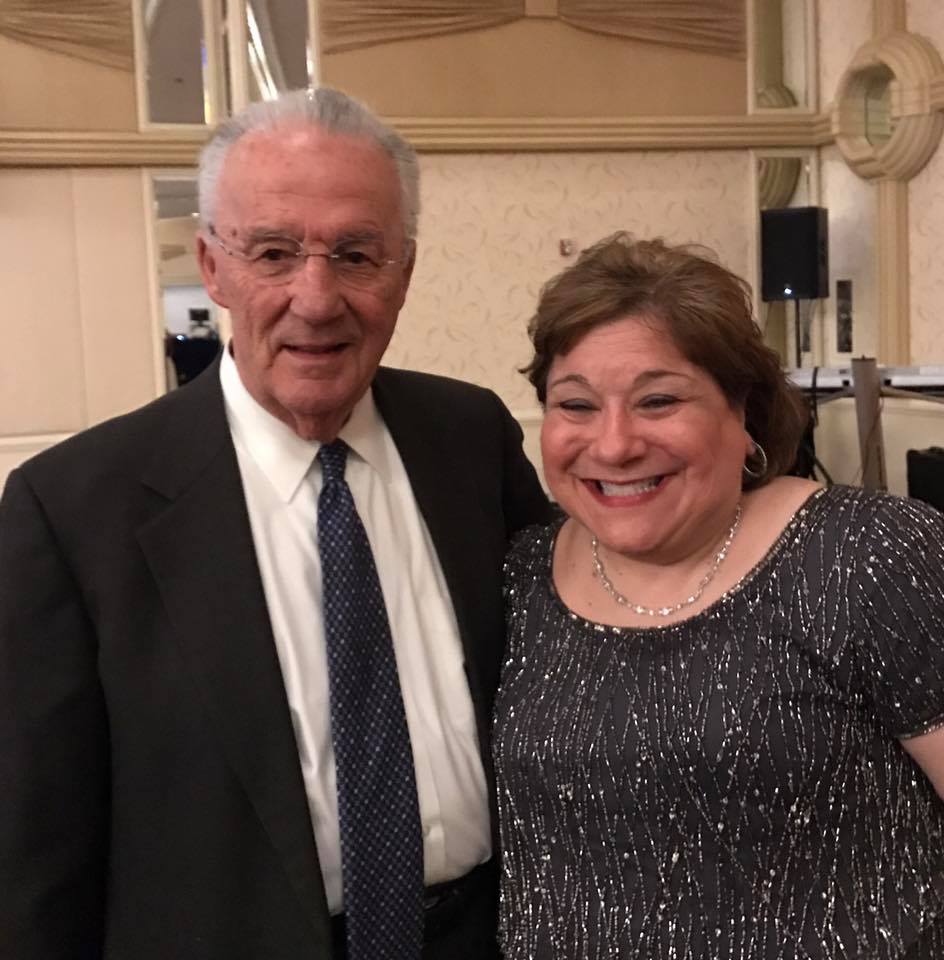 |
Chad Wilson from Nationwide
won the PAC Award
at the National PAC Conference, Miami Beach, FL. |
Senator
Paul Sarbanes
with Elizabeth Z. Bartz at the
American Hellenic Institute Gala, Washington,
DC. |
|
State and Federal
Communications, Inc.
Celebrates Employee
Anniversaries |

Amber Fish Linke,
Esq.,
Director, Client and Product Operations
celebrating 12 years on staff.
|

Megan Huber-Kovachik,
Marketing Communications Associate
celebrating her ninth year. |

Becky Campbell,
Compliance Assistant
now in her sixth year. |
|
Each month at our staff
meeting, Elizabeth acknowledges the employment
anniversaries of our staff.
In March
we acknowledged three team members.
These employees are exceptional members of the staff.
Congratulations to you all. |
|
|
|

Plan to say hello at future
events where State and Federal
Communications, Inc.
will be attending and/or
speaking regarding compliance issues. |
|
Events
|
April 7, 2017 |
2017 PACS, Politics, and Grassroots Conference, Washington,
DC |
|
April 11, 2017 |
WGR Toastmasters, Washington, DC |
|
April 11, 2017 |
WGR Leadership Program Final Session,
Washington, DC |
|
April 13, 2017 |
Montgomery County Council - African Affairs Advisory Group
Meeting, Silver Spring, Maryland |
|
April 21, 2017 |
You-Too Social Media Conference,
Kent, Ohio |
|
April 25 - 26, 2017 |
Public Affairs Council Spring Executive Meeting, Washington,
DC |
|
April 25, 2017 |
Public Affairs Council Annual Member
Dinner, Washington, DC |
|
April 25, 2017 |
WGR Toastmasters, Washington, DC |
|
April 26 - 27, 2017 |
Campaign Tech East Conference 2017, Washington, DC |
|
April 26, 2017 |
Public Affairs Council Board Meeting,
Washington, DC |
|
|
COMPLIANCE
NOW is published for our customers and friends.
Click here
to
SUBSCRIBE
or
click
here to UNSUBSCRIBE.
Click here to send us comments regarding
the COMPLIANCE NOW e-newsletter.
State and
Federal Communications, Inc. | Courtyard Square | 80 South
Summit St., Suite 100 | Akron, OH 44308 |
| 330-761-9960 |
330-761-9965-fax | 888-4-LAW-NOW|
http://www.stateandfed.com/

|
 |
The Mission of State
and Federal Communications is
to make sure that your
organization can say, "I Comply."
We are the leading
authority and exclusive information source
on
legislation and regulations surrounding campaign finance
and political contributions; state, federal, and
municipal lobbying; and procurement lobbying.
Contact us to learn how
conveniently our services will allow you to say "I
Comply" for your compliance activities.
http://www.stateandfed.com
|
www.stateandfed.com |
|
![]() View Full Print-Friendly Version
View Full Print-Friendly Version